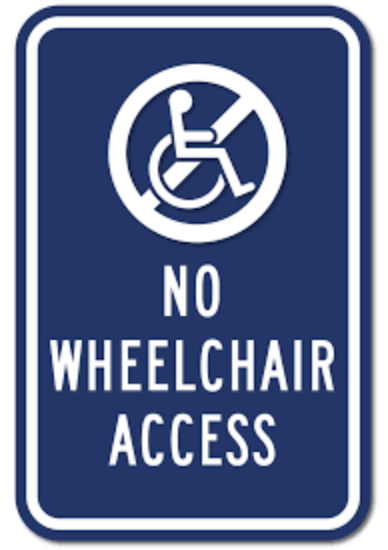Accessibility on Campus

Courtesy of ADA sign depot
By Rebecca Roberts
This is an independently submitted op-ed for our Quill section. Views and statements made in this article do not necessarily reflect the opinions of The Tower.
Attending The Catholic University comes with both advantages and flaws, and one glaring flaw that must be addressed is the abhorrent lack of accessibility on campus. I have personally experienced and witnessed accounts of accessibility issues in terms of wheelchair accessibility, hearing loss, dietary restrictions, and privacy of DSS accommodations.
Personally, I have several dietary restrictions. For three years, I was on a meal plan and experienced extreme inconsistencies with dining services. I was told by the dietician to use the dine-on-campus app to see ingredient lists for all food in the eatery, but there were several instances where the ingredients listed were completely inaccurate. There were multiple instances where there was meat listed as an ingredient in the vegetarian section, and allergens listed in the allergen-free section. I emailed the dietician with screenshots, and she said that the app was inaccurate sometimes and to trust that something in the allergen free section was truly allergen-free. What is the purpose of an app that shows ingredients if the ingredients are not accurate? There have also been instances where the gluten-free fridge is empty and texting the manager’s number provided did not warrant a response for upwards of 15 minutes, a large chunk of a student’s average break between classes. On this particular issue, these examples barely scratch the surface.
In terms of wheelchair accessibility, anyone can look around and see that this campus is lacking. Several buildings do not have elevators, there are cracked and uneven sidewalks all over the grounds, and steep hills that become detrimental and dangerous for wheelchair users when it rains or snows. In these unsafe situations, a wheelchair-using student could call the shuttle via the parking office, but the parking office only runs during weekdays and doesn’t begin operations until 9 am. When the parking office is not running, a student could call DPS and wait 30 minutes for a DPS car to be prepared for a wheelchair and drive to the student’s location. If the student is caught in rain or snow, this could be incredibly dangerous at worst and extraordinarily inconvenient and uncomfortable at best. There are also several buildings that have no accessible entrances, or the only accessible entrances are loading docks/staff entrances that students do not have clearance to enter and must call DPS to be let in.
Another area that is lacking is accommodations in class. During the pandemic, I was in a class on zoom that included a student who was hard of hearing. We had a DSS closed captioner in our class, but there were multiple occasions where she simply did not show up to class, without notice. There have also been numerous classes I have attended wherein the professor announced that there is a “No technology policy in class unless you have a DSS accommodation.” These announcements have always brought attention to the 1 or 2 students in class on their laptops, and essentially this acts as the professor outing to the entire class who has a disability.
These issues are riddled throughout classes, buildings, and the campus grounds themselves. This is not a problem that can be solved quickly, but it is a glaring problem that is preventing students with disabilities from being able to fully experience the education and community that they pay to experience.





